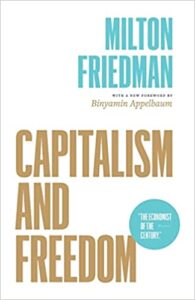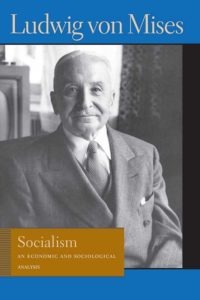Capitalism and Socialism
Barry, Norman, “The Tradition of Spontaneous Order” (Literature of Liberty, 1982)
Brennan, Jason. Why Not Capitalism?
Even in an ideal world, private property and free markets would be the best way to promote mutual cooperation, social justice, harmony, and prosperity. Socialists seek to capture the moral high ground by showing that ideal socialism is morally superior to realistic capitalism. But, Brennan responds, ideal capitalism is superior to ideal socialism, and so capitalism beats socialism at every level.
Cohen, G.A. Why Not Socialism?
Is socialism desirable, possible, or moral? Cohen makes his case in this slim volume.
See also Arnold Kling’s review of this title and James Otteson on The End of Socialism at EconTalk.
Friedman, Milton, Capitalism and Freedom.
How can we benefit from the promise of government while avoiding the threat it poses to individual freedom? In this classic book, Milton Friedman provides the definitive statement of an immensely influential economic philosophy—one in which competitive capitalism serves as both a device for achieving economic freedom and a necessary condition for political freedom.
Guyot, Yves, The Tyranny of Socialism.
One of several books Guyot wrote attacking socialism in the late 19th and early 20th centuries. In this volume, in the tradition of Bastiat, he criticises what he calls “socialistic sophisms,” socialistic legislation, strikes, subsidies to business, and the connection between militarism, protectionism, and socialism.
Hayek, F. A., (ed.), Capitalism and the Historians
Mill, John Stuart, Chapters on Socialism in Essays on Economics and Society, Part II, part of the Collected Works of John Stuart Mill.
Mises, Ludwig, Socialism.
Mises’ book is is the definitive refutation of nearly every type of socialism ever devised. Mises presents a wide-ranging analysis of society, comparing the results of socialist planning with those of free-market capitalism in all areas of life.
See also Steven Horwitz’s Liberty Classic and Rosolino Candela’s Liberty Classic on this title.
Mises, Ludwig von Mises, The Anti-Capitalistic Mentality.
Mises plainly explains the causes of the irrational fear and hatred many intellectuals and others feel for capitalism. In five concise chapters, he traces the causation of the misunderstandings and resultant fears that cause resistance to economic development and social change.
Molinari, Gustave de, The Society of To-morrow
Sweeping look at a world evolving from a state of war and expropriation to one of peace and liberty. Molinari proposes and explores interesting implications of competitive economic theory, such as competitively supplied governments replacing historical nationalities
See also the Annotated Bibliography of Gustave de Molinari, by David Hart.
Rogge, Benjamin A., Can Capitalism Survive? 1979
Benjamin Rogge (1920-1980, Professor at Wabash College, Indiana) collected together his entertaining essays in a volume titled after one of his most famous essays, Can Capitalism Survive? He touches on dozens of topics useful in the classroom and exciting as provocative reading, from the economics of cities, to one of his favorites: how to finance education, to the ways in which capitalism and free trade are discussed by the press, politicians, and in the classroom.
See also Dwight Lee’s Liberty Classic on this title.
Seldon, Arthur, The Virtues of Capitalism.
The Virtues of Capitalism, lays the foundation of Seldon’s views and theories of capitalism and its alternatives. The first part, Corrigible Capitalism; Incorrigible Socialism, was first published in 1980. It explains why, Seldon believes, “private enterprise is imperfect but redeemable,” but the “state economy promises the earth, and ends in coercion to conceal its incurable failure.” The second part, Capitalism, is widely considered to be Seldon’s finest work. It covers a wide range of the classical liberal thought that inspired the movement toward free-market reforms in Great Britain and intellectually opposed the collectivist tide of socialism.
Shaw, George Bernard and Wilshire, Henry Gaylord, Fabian Essays on Socialism.
This collection of essays by the so-called “Fabian Socialists” (who advocated socialism by means of gradual political and economic reform instead of by revolution as preferred by the Marxists) prompted a vigorous defense of laissez-faire economic policies by leading English classical liberals in the early 1890s.
Spencer, Herbert The Man Versus The State, with Six Essays on Government, Society, and Freedom. 1992; first published 1884.
Herbert Spencer’s collection of essays on sociology, political organization, representative government, and the role of government arrived at the cusp of classical liberal thought. Opposed to both imperialism and socialism (because each ultimately depended on servitude—slavery to an outside force as opposed to individual freedom), Spencer struggled to present his ideas to a world that, during his lifetime, continued inexorably down those very paths.
Six more of his essays on related topics, originally published between 1843 and 1891 in a variety of the many magazines to which Spencer contributed and sometimes served as editor, have been added in subsequent editions, and are available in this Econlib edition.
Schumpeter, Joseph, Capitalism, Socialism and Democracy.
Joseph A. Schumpeter introduced the world to the concept of “creative destruction,” which forever altered how global economics is approached and perceived.



